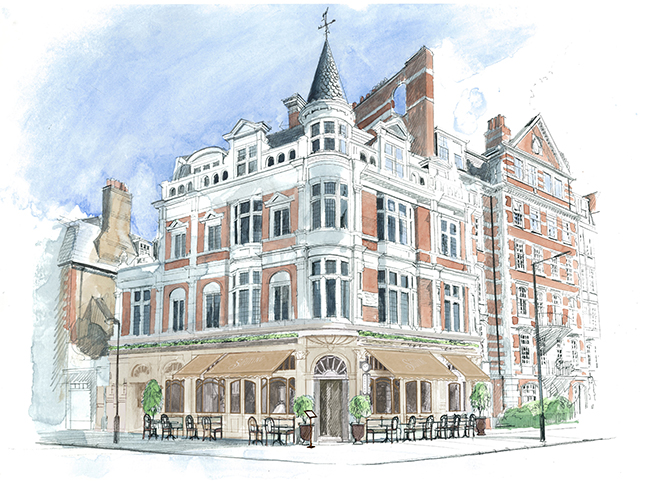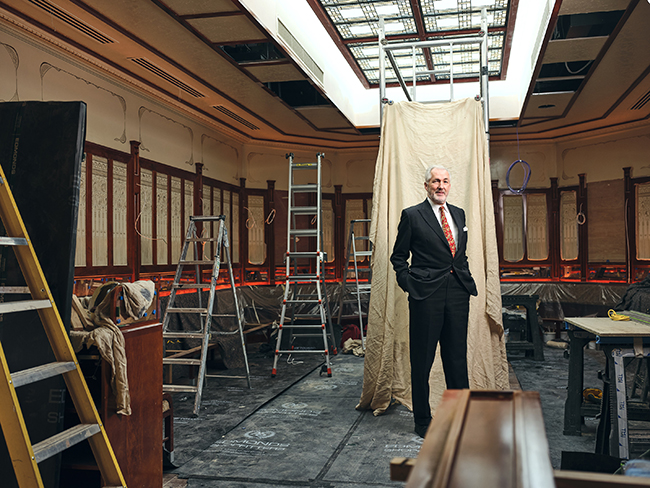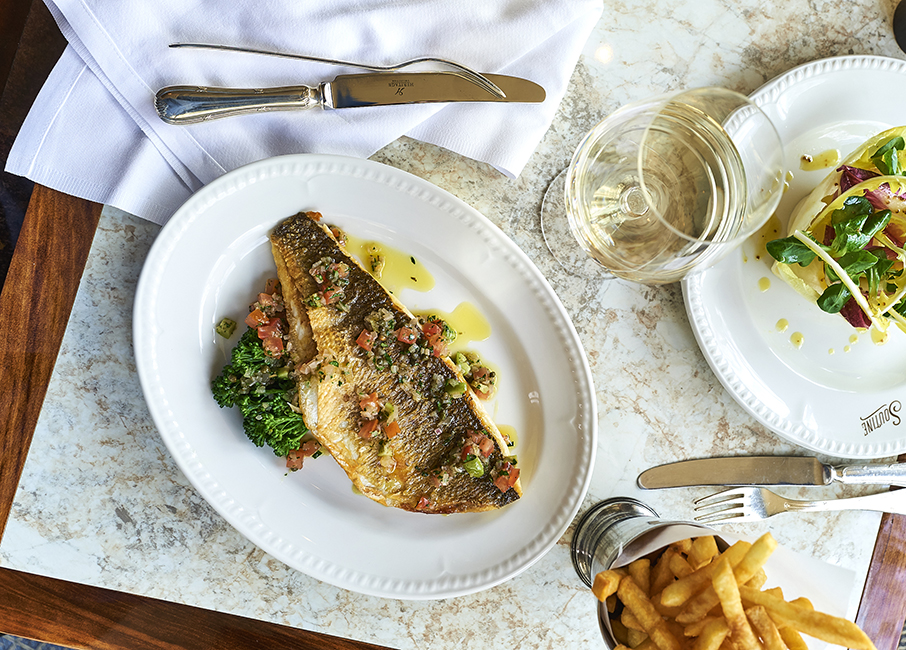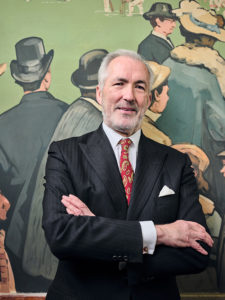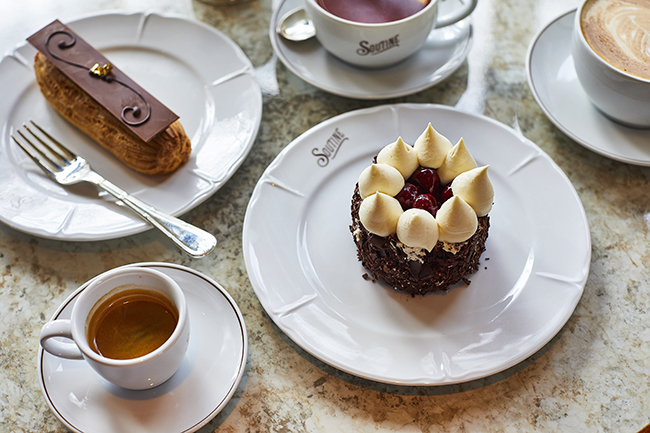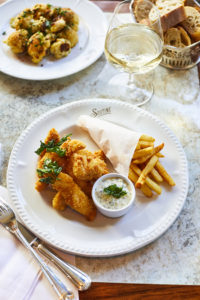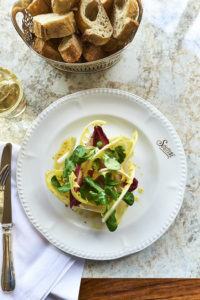A fine art: Jeremy King on St John's Wood restaurant Soutine
Jeremy King recounts the tale behind his new venture Soutine in St John's Wood, incorporating art, literature and history to create a restaurant with a truly compelling narrative. Emma Lake reports
"There is always the love of a story," Jeremy King says as we sit in the office of his now nine-strong restaurant group, surrounded by accolades amassed over a hospitality career spanning some four decades.
A journey through the Corbin & King portfolio would include stops at traditional Parisian brasseries and all-day boulevard cafés, as well as the Viennese eateries of the early 20th century and, of course, the grand cafés that inspired the Wolseley in London's Piccadilly.
Neighbourhood restaurant Soutine - taking its name from French-Russian expressionist artist ChaÁ¯m Soutine - is the latest addition, opening in the north London village of St John's Wood and drawing inspiration from the artistic heritage of the area, as well as nearby Lord's cricket ground.
King says he is guided by "intuition and instinct" when developing a restaurant, with the building and its environment commanding the direction. As with Colbert in Chelsea and Fischer's in Marylebone, Soutine has been created as a distinct standalone neighbourhood restaurant, inspired by King's research and visits to the area.
He explains: "There are a lot of contributing factors to the character of St John's Wood, and the most noted is the number of artists that lived in the area. When I discovered there had been a St John's Wood art school not far away, which had been formed by, among others, ElÁseo Abelardo Alvarez CalderÁ³n, who had come from Paris, the gem of an idea developed.
"We liked the art school because, unlike anywhere else in the 19th century, they encouraged women to become artists. Every- where you go in St John's Wood, you find blue plaques as a testimony to the artists. Furthermore, we discovered that when the art school closed it became the Anglo-French Art Centre. Suddenly, it seemed that a French restaurant was appropriate.
"The other major influence in the area is that of Lord's, so when you enter, you'll find an element of both worlds, although most predominantly the artistic. The food will hark back to a period for which Soutine was known, which was the School of Paris 1910-1930, where he joined Amedeo Modigliani, Marc Chagall and many other immigrant artists on the Paris stage. They spent their time in boulevard cafés and grand cafés; the very nature of Soutine is derived from that, and I like to think that they might have felt comfortable sitting in the present-day Soutine."
The restaurant's menu will be predominantly French-inspired - with some Russian flourishes to pay homage to its artist namesake. Its design draws inspiration from the Arts and Crafts movement, which was flourishing across Europe at the time. Decorative panelling lines the dining room, and intricate engravings of grapevines weave their way up the imposing cherry-wood bar that greets diners as they enter. The artistic and environmental influences come together in a mural by artist Michael May, which winds its way up the restaurant's stairwell, depicting early 1900 street scenes as well as a cricket match being played at nearby Lord's.
Story time
Corbin & King's restaurants have long been lauded for their timeless interiors and the environments they help to create.
"I'm always a little intrigued how quickly people adopt our stories," King says. "Not all the restaurants have them because they stand up by themselves; it tends to be the more local restaurants. There's a narrative interwoven with fact - that, for me, is exciting and it gives it a life."
e restaurateur says the most striking example of this came with the opening of Fischer's, which takes its influence from the Viennese cafés of the early 20th century. He had written an introduction for staff setting the scene of Austria's capital: the cafés, art, theatre and politics that would have seen a family head to London to open a restaurant. When a long-standing customer enquired about the history, he was handed the synopsis, which brought him to tears, so similar was it to the experiences of his grandfather. On another occasion, King's longstanding design partner, Shayne Brady of BradyWilliams London, struggled to convince a confused optician that he had helped to create the restaurant, with the latter believing it had already been open for "70 or 80 years".
Diners have yet to sit in the seats in which King hopes Chaim Soutine and his contemporaries would have felt comfortable as they discussed the shattering of the shackles of classicism and the emergence of new artistic movements. When they do, many may not choose to read into the carefully chosen details of their surroundings, but the restaurateur hopes they share the artists' feeling that these public spaces provide a canvas for their own experiences.
He says: "Restaurants are the heart-blood of society and, over the years, most artistic, literary, revolutionary and political movements have come out of restaurants, cafés, coffee shops and so on. You go to a restaurant to meet a friend, have a reunion with family, meet a spouse, for an interview, to fire someone, to seduce, to divorce. People use restaurants in all sorts of ways and a great restaurant allows all that to happen."
Inclusivity has always been at the heart of King and Corbin's mantra, through a resolution to serve people what they want to eat, rather than what the chef wants to serve them, and "to treat people as we would like to be treated".
King says that allowing this to happen and enticing people from all walks of life through the door help to make a great environment. He explains: "People ask me what makes a successful restaurant and they expect me to talk about location, chef, interior - all that sort of thing. Yes, they're all factors, but the top two things are heart and soul. What I think we strive for most is integrity and authenticity. We teach that you never look at someone coming through the door as a potential source of income; you look at them as an opportunity to give someone a great time.
"Chris and I always worked on the basis that we must give people the opportunity to spend, but we must not make it mandatory, because a lot of the most interesting people who come to restaurants are the least affluent and it's a balance. For a restaurant to be interesting, people need to feel welcome, even if they're not spending much money."
When it comes to menus and service, King is a traditionalist. When he and Corbin entered the business, a survey found that people would dine in a restaurant less than once a year. He says that while the British have come on a long way, they do not yet use restaurants like their European counterparts - and service should reflect this.
He says: "Once a manager watched me going around a room and said, 'I don't understand it, you know a lot of these people really well and you hardly said hello'. I said, yes, they don't want me to. They're in the middle of talking. They want me to know they are there, to acknowledge them so they feel reassured and that they're going to be looked after. Where restaurateurs go wrong is they start regaling their customers with tales; I've had many a meal ruined by a restaurateur sitting down at my table. We have to respect the customer at every level; never take them for granted. Always be acutely aware that unless we're careful, they may become jaded.
Continue reading
You need to be a premium member to view this. Subscribe from just 99p per week.
Already subscribed? Log In



